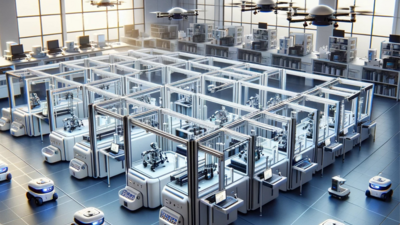Smart Factory Grids | DFG Research Impulse Methodologies for service-based, highly flexible, dynamically distributed production with autonomous, adaptive and resilient systems
With the Smart Factory Grids research programme funded by the German Research Foundation (Deutsche Forschungsgemeinschaft (DFG)), Esslingen University of Applied Sciences is establishing a permanent interdisciplinary research network that will provide pioneering impetus, innovations and findings for the transformation of the manufacturing industry, particularly in the industrial location of Baden-Württemberg.
The research initiative pursues the vision of dynamically distributed production in the future, consisting of several production facilities, each with specialised capabilities, in order to enable highly flexible production for small quantities with short set-up times.
Interested? Apply now! for the summersemester 2026
Get started
find a course





